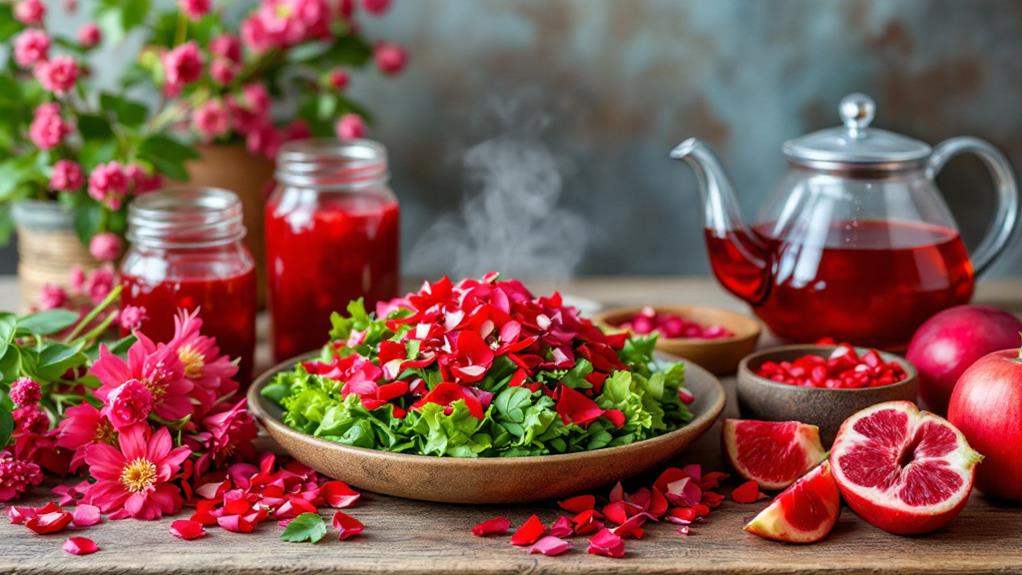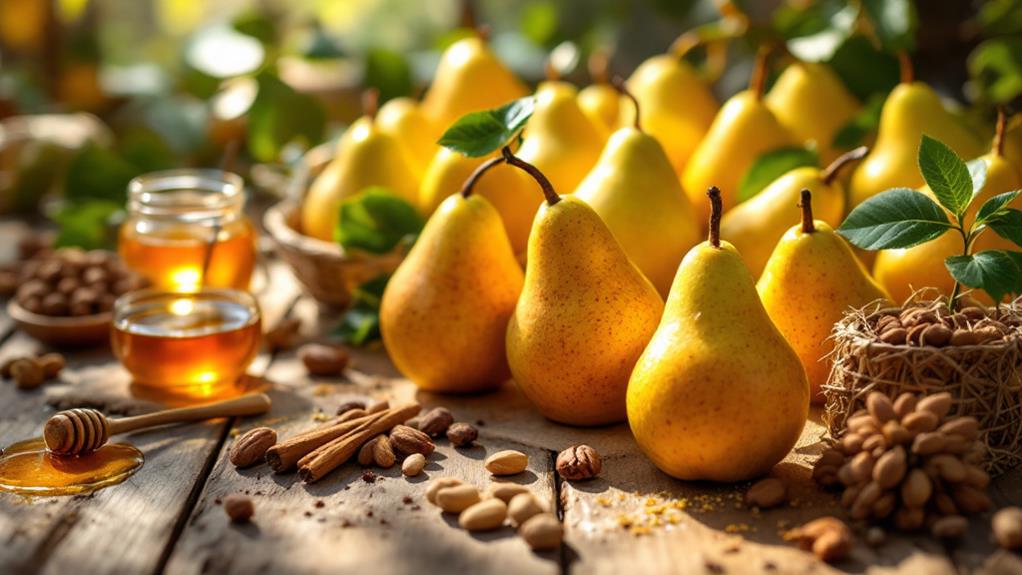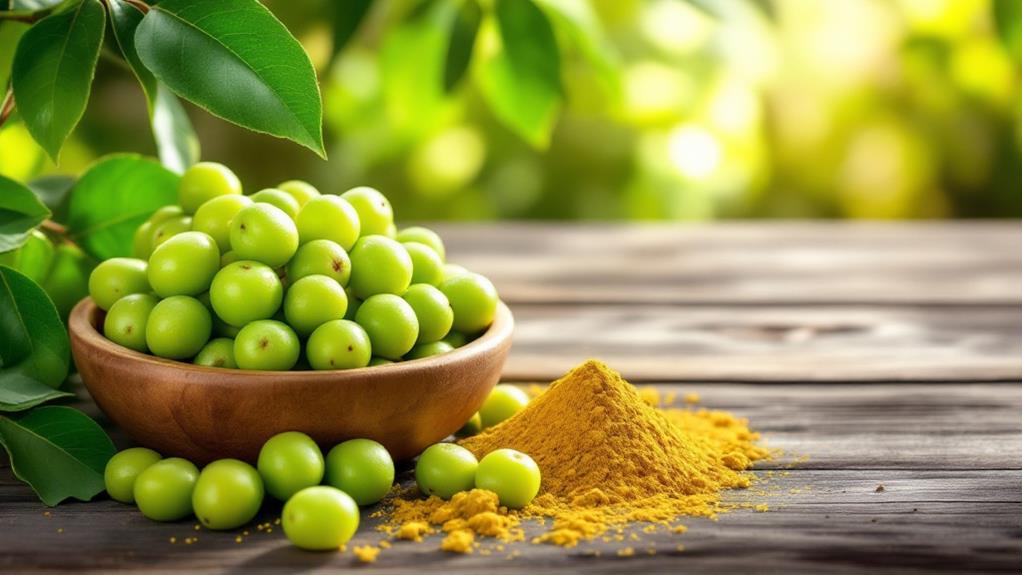What Is the Roselle Flower? Health Benefits and Uses

You'll find the roselle flower, known scientifically as Hibiscus sabdariffa, is more than just a pretty plant with its vivid red calyces. It's packed with health benefits, boasting vitamin C, antioxidants, and a range of bioactive compounds that offer anti-inflammatory and antimicrobial effects. You can use it for numerous purposes, from making invigorating beverages like hibiscus tea to creating tangy jams or homemade beauty treatments. It's also helpful for digestive health, weight management, and even regulating blood pressure. Exploring further will reveal its nutritional richness and adaptable applications in your daily life.
Understanding the Roselle Flower
The Roselle flower, scientifically known as Hibiscus sabdariffa, is a striking plant with vivid red calyces that's native to Africa and the Caribbean. This lively hibiscus species thrives in tropical climates and has been cherished for its health benefits and traditional uses. You might know it from popular beverages like zobo or bissap, which not only refresh but also support your health.
Rich in vitamin C, Roselle acts as a potent antioxidant, enhancing your immune system and promoting general well-being. The flower's bioactive compounds, including anthocyanins and flavonoids, play a critical role in its health-enhancing properties. These compounds offer anti-inflammatory and antimicrobial effects, making Roselle an excellent supplement to your diet if you're looking to strengthen your defense against common ailments.
Throughout history, traditional uses of Roselle have highlighted its therapeutic potential. In herbal medicine, it's been used to address multiple issues such as hypertension and digestive discomfort. This cultural significance underscores the plant's value beyond just its appealing taste. By incorporating Roselle into your routine, you can harness its assorted benefits, supporting your immune system and general health with its unique blend of bioactive compounds.
Nutritional Profile of Roselle
Packed with vital nutrients, Roselle offers a robust nutritional profile that can greatly improve your health. Scientifically known as Hibiscus sabdariffa, this lively flower is rich in vitamins A, B1, B2, B3, and C, providing a substantial increase to your overall health. These vitamins are fundamental for maintaining skin health, energy levels, and immune function. Furthermore, Roselle is a great source of important minerals like Calcium, Iron, Magnesium, Phosphorus, and Potassium, which contribute to bone health, oxygen transport, and muscle function.
One of the standout features of Roselle is its high antioxidant content, including compounds like anthocyanin and protocatechuic acid. These antioxidants help combat oxidative stress, promoting cellular health and possibly reducing the risk of chronic diseases. Despite its rich nutritional benefits, Roselle is low in calories, making it an excellent choice for weight management.
In addition to its vitamins and minerals, Roselle provides carbohydrates and natural fats, supporting your body's energy needs. If you're looking for convenience, you can find Roselle in a concentrated form through freeze-dried powder, which retains its nutritional benefits and can be easily incorporated into your diet.
Culinary Uses

Beyond its nutritional benefits, Roselle takes center stage in the culinary world with its versatile uses. You can transform its lively dried calyces into a bright red beverage known as roselle juice or flor de jamaica. This revitalizing drink is beloved across many cultures for its tangy taste and health benefits. Packed with vitamin C and antioxidant properties, the beverage not only quenches thirst but also supports your immune system.
In the kitchen, dried calyces of Roselle are a favorite for making jams and jellies. They lend a tangy flavor and a striking red hue to these sweet spreads, making them as visually appealing as they are delicious. Roselle is also a natural food coloring agent, adding rich color to dishes and drinks without artificial additives.
Don't overlook fresh Roselle leaves, which provide a spicy, sour kick when tossed into salads. This unexpected twist improves your dish's flavor profile, making it both nutritious and delightful. Regardless of you're incorporating Roselle into traditional recipes or experimenting with new culinary uses, its unique taste and health-boosting properties make it a must-try ingredient in your kitchen adventures.
Skin Health Benefits
While Roselle's culinary uses captivate your taste buds, its benefits extend far beyond the kitchen. This lively flower is a powerhouse for skin health, thanks to its rich content of antioxidants and anti-inflammatory properties. Antioxidants in Roselle combat free radicals, protecting your skin from damage and premature aging. Imagine having a natural shield that helps preserve your skin's youthful glow.
Roselle's anti-inflammatory properties can soothe skin irritations and reduce redness and swelling. If you struggle with sensitive skin, incorporating Roselle-based products could be your secret weapon. Here's how it supports skin health:
- Hydration and Elasticity: Roselle's hydrating qualities promote skin elasticity, giving you that coveted healthy glow.
- Collagen Production: With a high vitamin C content, Roselle supports collagen production, maintaining skin firmness and smoothing out fine lines.
- DIY Beauty Treatments: You can incorporate Roselle into scrubs and facial masks, enhancing your skin's comprehensive health through regular use.
Digestive Health Support

Regarding digestive health, Roselle offers impressive support through its high fiber content, which promotes regular bowel movements and helps prevent constipation. If you're struggling with bloating or indigestion, regular consumption of Roselle tea can bring relief and contribute to your complete digestive comfort. Its natural laxative properties work wonders for gastrointestinal health by encouraging fluid balance and optimizing nutrient absorption.
Adding Roselle to your routine can also improve your gut flora, thanks to its rich supply of antioxidants. These antioxidants play a vital role in improving the balance and function of your digestive system, offering a natural way to enhance your gastrointestinal health. By improving gut flora, Roselle helps guarantee your digestive processes run smoothly and efficiently.
Moreover, studies suggest that Roselle extracts may positively influence metabolic health, further supporting your digestive well-being. By incorporating Roselle into your diet, you're not only promoting better digestion but also setting a foundation for a healthier metabolism. So, if you're looking to improve your digestive health naturally, consider making Roselle a regular part of your diet. You'll likely notice improvements in how you feel and function day-to-day.
Weight Management Benefits
Roselle's weight management benefits are impressive and worth considering in your wellness adventure. This lively flower, often used in teas, offers a delicious and low-calorie way to aid your weight management goals. By choosing hibiscus tea, known for its potential to reduce fat absorption, you can support your weight loss efforts naturally. Here's how Roselle can be part of your strategy:
- Improves Metabolism: Drinking Roselle tea may elevate your metabolism, helping you burn more calories throughout the day. This natural improvement can be a valuable ally in your weight control quest.
- Curbs Appetite: Regular consumption of hibiscus tea is known to help curb your appetite and reduce cravings. This can lead to healthier eating habits and make it easier to maintain a balanced diet.
- Promotes Digestive Health: The high fiber content in Roselle supports digestive health, which is vital for comprehensive weight management. Improved digestion can alleviate bloating and keep your system regular.
Additionally, Roselle may have benefits for blood pressure, as regular intake can assist with managing high blood pressure, promoting general cardiovascular health. Incorporating Roselle tea into your routine is a delightful way to support your wellness goals.
Anti-Inflammatory Properties

Many people seek natural ways to combat inflammation, and the Roselle flower offers a potent solution. Bursting with antioxidants like anthocyanins and flavonoids, Roselle effectively fights oxidative stress and inflammation. These powerful compounds work to reduce markers such as MCP-1 and TNF-α, which are often linked to chronic inflammatory conditions. By incorporating Roselle into your routine, you can tap into its anti-inflammatory benefits, potentially alleviating issues like arthritis and other inflammatory disorders.
Drinking Roselle tea regularly may be particularly helpful. It's been associated with a decrease in symptoms related to inflammatory diseases, improving joint health and mobility. This makes it a valuable natural remedy, providing a safer alternative to synthetic medications that often come with unwanted side effects. In traditional medicine, Roselle's soothing anti-inflammatory properties have also been utilized to address skin irritations, promoting comprehensive skin health and comfort.
Blood Pressure Regulation
Throughout the years, hibiscus tea, made from the Roselle flower, has gained recognition for its ability to help manage blood pressure. If you're dealing with pre-hypertension or mild hypertension, incorporating this tea into your daily routine might be advantageous. Clinical studies highlight that hibiscus tea can lower systolic blood pressure by up to 10.4 mmHg and diastolic pressure by 5.7 mmHg. Over a period of 48 days, regular consumption has shown effects comparable to some antihypertensive medications.
The secret behind hibiscus tea's effectiveness lies in the active compounds found in Roselle, particularly anthocyanins and flavonoids. These compounds support healthy blood vessel function and fluid balance, essential elements for maintaining ideal blood pressure. Furthermore, hibiscus tea acts as a natural diuretic, helping your body eliminate excess sodium and fluid, which can further aid in blood pressure regulation.
Consider these benefits of hibiscus tea:
- Blood Pressure Control: Reduces systolic and diastolic pressure.
- Active Compounds: Anthocyanins and flavonoids support vascular health.
- Natural Diuretic: Promotes fluid balance, lowering cardiovascular disease risks.
Immune System Enhancement

While you might be familiar with Roselle tea for its cardiovascular benefits, this lively flower also plays an significant role in enhancing your immune system. Packed with vitamin C, Roselle is a powerhouse for immune function, helping your body ward off infections and reduce inflammation. When you regularly consume Roselle tea or juice, you're giving your immune system a natural uplift, lowering the risk of infections by fortifying your body's defenses against pathogens.
Moreover, the antioxidants in Roselle, such as anthocyanins and flavonoids, are vital in combating oxidative stress and inflammation. These compounds help neutralize harmful free radicals, protecting your cells and enhancing general immune resilience. Studies have shown that Roselle extracts may even promote the production of antibodies, strengthening your immune response.
Incorporating Roselle leaves into your diet not only supports immune health but also aids wound healing and improves blood circulation, thanks to its high vitamin C content. By doing so, you're enhancing your body's physical resilience. So, next time you enjoy a cup of Roselle tea or add its leaves to your meals, remember you're investing in robust immune health.




